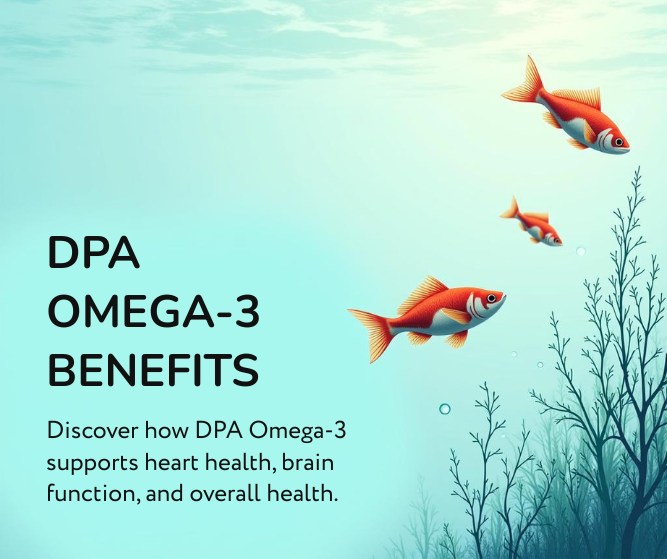
When it comes to omega-3s, you’ve probably heard of EPA and DHA. They’re the ones listed on most fish oil supplements and often talked about for heart and brain health. But recently, I came across something I hadn’t heard much about before – DPA, sometimes called the “missing omega.”
I was curious. What is DPA? What does it actually do? And more importantly, do we really need it? I started digging into the research, looking for real answers backed by science – not hype. Here’s what I found.
Table of Contents
What DPA actually is (and what it isn’t)
DPA stands for docosapentaenoic acid, but don’t worry, you don’t need to remember the full name. What’s helpful to know is that DPA is one of the lesser-known omega-3 fatty acids, along with the more famous EPA and DHA.
These three are closely connected. You can think of them as rungs on a ladder:
EPA → DPA → DHA
Your body adds a little piece to EPA to make DPA (with help from a special enzyme called ELOVL2), then adds one more step to make DHA. And interestingly, it can also go backwards – converting some DPA back into EPA when needed.
This makes DPA a kind of built-in reserve that your body can tap into to support heart and immune health.
Common misunderstandings about DPA
Now, let’s clear up a few common mix-ups:
- DPA is an omega-3, not omega-6, omega-9, or anything else. It belongs to the same family as EPA and DHA.
- It’s not a “weaker” or unnecessary omega-3. In fact, new research shows that DPA might have its own unique benefits, separate from the others. We’ll get into those in the next section.
- Often left off labels, but still present. Many fish-oil products contain DPA even if it isn’t listed; a detailed lab report will usually show it.
And just to be clear: DPA is naturally found in the body, especially in blood vessels, breast milk, and certain parts of the brain. It’s not synthetic or man-made.
So while it’s not as well-known as EPA or DHA, DPA is very much a real, naturally occurring omega-3, and it may be playing a quiet but important role in your health.
Do we really need it?
There’s no official “daily dose” of DPA – yet.
Health guidelines haven’t set a specific DPA amount yet. In Australia, for example, the NHMRC groups DPA together with EPA and DHA under ‘long‑chain omega‑3s’, but it doesn’t give it its own number.
Still, research is starting to point toward a role for DPA, especially when it comes to heart health.
A large 2024 study involving over 300,000 adults found that people with the highest levels of EPA, DPA and DHA in their blood were about 45% less likely to die suddenly from heart-related causes than those with the lowest levels.
Another study looked at people with kidney failure who had just started dialysis (a treatment that filters the blood when the kidneys can’t). In that high-risk group, those with more DPA in their blood were about one-third less likely to die suddenly from heart problems within their first year of treatment – even after adjusting for age, diet and other health factors.
These studies don’t prove DPA prevents heart issues on its own, but they do suggest it might be a helpful part of the mix, especially alongside EPA and DHA.
DPA might act as a “back-up” for EPA
Your body can convert some DPA back into EPA if it needs to. In one small human trial where people took a pure DPA supplement, not only did their DPA levels rise, but EPA levels increased too – which shows your body can draw on DPA when needed.
Bottom line:
There’s no official target for DPA yet, but early research suggests it supports heart health – and may help keep your overall omega-3 levels balanced. Whether through food or supplements, getting some DPA in your diet looks like a smart move.
What are all the benefits of DPA?
We’ve already seen how DPA might support heart health – now let’s break down the full range of possible benefits backed by research.
1. Supports heart health
Beyond its link to fewer cardiac events, DPA is also associated with lower triglycerides and cholesterol – two types of fat in the blood that are linked to heart disease.
It may also help reduce inflammation in blood vessels, and some studies even connect it to less plaque build-up in the arteries (known as atherosclerosis), especially in older adults.
2. Helps keep blood flow in check
DPA may help keep your blood flowing smoothly by reducing unwanted clotting. Some research shows it can actually be more effective than EPA or DHA at stopping platelets (tiny blood cells) from clumping together when they shouldn’t. This could help lower the risk of blood clots and support healthy circulation.
3. May support blood sugar balance
In early animal studies, DPA-rich oils helped lower blood sugar and improve how the body processes fats and glucose. It’s still early days, but it points to potential benefits for metabolic health and conditions like insulin resistance.
4. Might support brain health as we age
In a U.S. study of adults over 60, those with higher levels of DPA in their blood scored better on memory and thinking tests, especially after age 70.
Other research has found that people with depression or other mental health issues often have lower DPA levels. Animal studies suggest DPA may help protect the brain from inflammation, ageing, and mood-related changes.
5. May help reduce chronic inflammation
DPA also plays a role in helping the body calm down inflammation. It’s been shown to support tissue repair, reduce inflammatory signals, and help make special compounds that the body uses to resolve inflammation – not just fight it.
The takeaway
DPA may not get the spotlight, but it’s showing real potential – not just for heart health, but also for how your blood flows, how your body handles sugar, and how your brain stays sharp with age. The benefits are still being explored, but they’re definitely worth paying attention to.
Where to find DPA in food (and how to actually get enough)
You won’t see DPA listed on food labels, but it’s found naturally in certain animal-based foods – mostly in seafood, with smaller amounts in pasture-raised meats. Here’s where to find it:
Best food sources of DPA (approx. per 100 g portion)
- Raw salmon – up to 393 mg
- Atlantic mackerel – 200+ mg
- Florida pompano – 200+ mg
- Pacific herring, sablefish, whitefish, bluefin tuna, rainbow trout – 100–200 mg (source)
- Grass-fed beef – small amounts, but significantly more than grain-fed
- Lamb (pasture-raised) – also contains small amounts of DPA
- Seal oil (traditional diets) – very rich in DPA, though not widely available commercially
How to actually get enough DPA from food
- Eat 2–3 servings of oily fish per week – salmon, mackerel, and herring are some of the best options.
- Choose grass-fed beef or lamb when possible – it won’t give you as much as fish, but still contributes to your overall omega-3 intake.
- Add plant-based omega-3s like flax or chia seeds – your body can turn a small portion into longer-chain fats like EPA and DPA, though the conversion is limited.
Best omega-3 supplements with DPA (and what to look for)
If you’re not eating much oily fish or grass-fed meat, a supplement can help fill the gap, but here’s what many people don’t realize:
Most omega-3 supplements only list EPA and DHA. That’s because many formulas contain only small amounts of DPA, so brands either leave it off the label or group it under “other omega-3s.” It doesn’t mean there’s zero DPA – just that there’s not enough to highlight.
If you specifically want the benefits of DPA, the better option is to choose a product that clearly lists it on the label. That way, you know exactly how much you’re getting.
Best omega-3 supplements with DPA (clearly listed on the label)
Below are four solid picks that publish their DPA dose, use reputable third-party testing, and keep additives to a minimum.
1. Carlson Super DPA – 300 mg DPA / teaspoon
A high-strength liquid fish oil that gives you one of the biggest DPA doses available. It’s IFOS-certified for purity and comes in a mild berry-lemon flavour to help mask the fish taste. A great option if you want the most DPA in the fewest servings.
Available from: US Amazon / Carlson Labs / NHC
2. Ballstad Omega-3 – 120 mg DPA / 3 capsules
Made from wild-caught Norwegian fish and bottled at the source. These soft-gels are small and easy to swallow, with a good mix of EPA, DHA, and DPA – all tested to international standards for purity and freshness.
Available from: Ballstad (get 10% off with a code BEHEALTHYNOW10)
3 . Swanson Super DPA Fish Oil – 85 mg DPA / soft-gel
A simple, budget-friendly capsule that still gives you a meaningful dose of DPA. It also includes a good amount of DHA and is third-party tested. A solid choice if you’re looking for an affordable way to top up your omega-3s.
Available from: Amazon US / Dolphin Fitness
4. Freshfield Vegan Omega-3 DHA + DPA – 70 mg DPA / 2 capsules
One of the few plant-based options with DPA from algae oil (not fish). It’s carrageenan-free, third-party tested, and packaged with sustainability in mind. A clean choice for vegans who want both DHA and DPA.
Available from: Amazon UK / Amazon US
DPA vs. EPA vs. DHA – Quick FAQs
Is DPA better than EPA or DHA?
Not better – just different. DPA sits between EPA and DHA in the body’s omega-3 pathway and may act as a “reserve” form of EPA. It has unique benefits for heart health and blood flow, but all three omega-3s work best together.
Can my body make DPA on its own?
Yes, your body can convert EPA into DPA, and sometimes convert DPA back into EPA if needed. But the amount depends on your diet and overall omega-3 intake.
Is it safe to take DPA supplements?
Yes, studies so far show that DPA is safe and well tolerated, even at doses over 300 mg/day. It’s naturally found in the body and in many fish-based foods.
Can high doses of omega-3s increase bleeding risk?
Possibly, at very high doses (usually over 3,000 mg per day of EPA/DHA combined). The American Heart Association notes this risk is low for most people but should be considered for anyone on blood-thinners.
What to remember about DPA
- DPA is the “quiet omega” – less famous than EPA or DHA, but still plays a key role in heart, blood, and brain health.
- You’ll find it mostly in oily fish like salmon, mackerel, and herring – and in smaller amounts in grass-fed meat.
- Most supplements don’t list DPA, so look for one that actually includes it on the label if you want to be sure you’re getting enough.
- Early research suggests DPA may help with blood fats, clotting, inflammation, and brain health as we age.
- You don’t need to overthink it. Eating oily fish a few times a week or choosing the right omega-3 supplement can easily cover your needs.
























